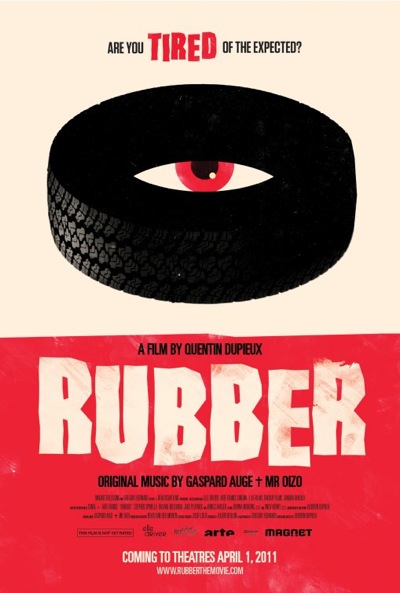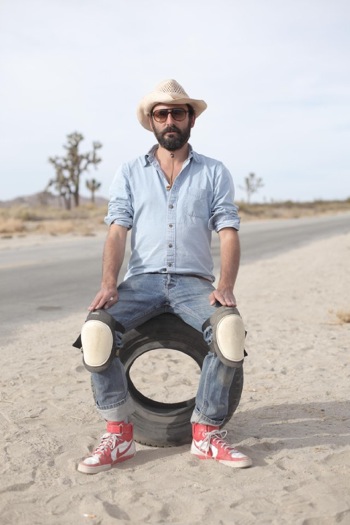
Quentin Dupieux's RUBBER is the bittersweet story of a car tire named Robert who, upon learning he possesses telekinetic powers, goes on a killing spree in the desert. As the great Samuel L. Jackson once said, "You either want to see that, or you don't."
And yet that logline really doesn't capture the spirit of Dupieux's film, which is as much about the arbitrariness of storytelling as it is an inanimate object blowing people up. The film is never really about Robert: it opens with a clever fourth-wall-shattering monologue from Stephen Spinella, and then introduces us to a group of "viewers" who observe the tire's progress via binoculars. It's only after this deconstructive perspective is introduced that we finally meet Robert - who, aside from exploding heads, has a thing for Roxanne Mesquida (indicating, if nothing else, that he has exquisite taste in women). From there, Dupieux shifts back and forth from absurd pseudo-horror film to the audience's analysis of what's transpiring off in the distance - like Neil Simon did in BRIGHTON BEACH MEMOIRS.
Before embarking on his feature filmmaking career with 2007's STEAK, Dupieux was best known as the influential house/techno/electro/etc. producer Mr. Oizo - so it's hardly a surprise that RUBBER's score (composed with Gaspard Auge) is one of the year's most sonically adventurous. But it's what Dupieux has accomplished in every other aspect of the film's production - particularly with the visuals and editing - that truly impresses. Shot on consumer-grade digital cameras, RUBBER looks like the work of a seasoned director/cinematographer team. But while Dupieux's technical chops appear to be formidable, he has no interest in placing them at the service of a studio production or, quite frankly, anything that might be remotely commercial. He just wants to make movies that are "half-really-stupid and half-smart" on his terms. This strikes me as a completely admirable ambition.
Since I feel like RUBBER speaks very eloquently for itself as a film, I went into my interview with Dupieux eager to talk about his creative process and aesthetic preference for practical f/x over CG. For those of you worried about spoilers (even though this isn't the kind of film that's easily "spoiled"), feel free to wade in.

Beaks: When you spend this much time talking about a finished film [Dupieux has been promoting RUBBER since Cannes 2010], do you find yourself wishing you could go back and make tweaks?
Dupieux: No, no. I'm not that kind of [artist]. It's the same with music: I'm quite good at deciding when something is finished. Even if it's not perfect, you can always... for example, I did the editing myself. This could've been reworked with a professional editor, but no. To me, it was done in my mind. It was finished. Done. Next. I'm only obsessed by it when I'm doing it; as soon as it's done, it's done. It's like a piece of music: you press record, you like the recording, it's done. You don't have to go back.
Beaks: But in music, it's quite common to remix, to sort of re-conceive a song. That doesn't happen much in film.
Dupieux: That's the good thing about film. RUBBER has been a very quick process. From the first line of writing to the end of editing, that was nine months. It's been really quick, and that was the point. Suddenly, when you make something that quick - when you write in three weeks and shoot in fourteen days - you can't spend two years thinking about it. No, it has to be quick. That was the idea from the start. This way, you have a little chance to make something fresh. If you think too much, if you work too much, if you let the editing sleep a little bit and then you go back to it months later, suddenly you have a new vision you want to cut differently. For this kind of project, I think that's bullshit. I wanted this to be fresh. It's quite hard to control, the freshness; you have to go fast and be confident. But that's part of the project. I like that.
Beaks: What was the first vision you had relating to this film.
Dupieux: This story is really stupid. I wanted to do a movie about an invasion of cubes from outer space. One day, people wake up and there are cubes floating everywhere. Just cubes. They don't talk and they don't move. It's scary, but they're not attacking people; they're just here. I started to write this, but then I said, "How am I going to do this?" So I did tests, and a few empty shots, and a friend of mine did the cubes in CGI. I was not interested in that process. Shooting an empty space and creating the thing on the computer... that was boring to me. So I had to go back and find something simple I could shoot: something I could touch. Something real in a way. And I don't know why I picked up the tire.
But I think your question was more about the first vision I had, which was a tire rolling very slowly, following someone. I just had this strong vision in my mind - and it was so filmic in my head, you know, that I decided this was a good idea. I decided, "This could be strong. This is nice to shoot. Let's write something where I can put this."
Beaks: You mentioned CG, which is something that's obviously over-relied upon now. The nice thing about Robert is that he's a practical thing; he's a real tire - and you use different techniques to make him live. What is it about CG that bothers you?
Dupieux: I really like to shoot something, and then watch the footage and it's the movie already. I hate the process of shooting something and then working on the computer to make it better. I don't like this. I think I'm old fashioned. Every day on RUBBER, after every day of shoot, even if I was tired and exhausted, I was in my hotel room watching shots. That's why I do this job: I love filming. I'm not against CG at all; I just hate the process. Now they just shoot here (points out the window), and then someone puts a blue sky in. There's something wrong. I like to shoot real stuff. Obviously some movies are better because of the CG effects, but that's one category of movies.
Beaks: But it's a much smaller category of movies than use CG. I think we probably grew up on the same movies; I know you've cited Spielberg's DUEL as an influence. Surely, it's a generational thing, but to this day, when I watch John Landis's AN AMERICAN WEREWOLF IN LONDON, I'm watching a man transform into a beast, not Rick Baker's f/x work.
Dupieux: It is different. The feeling you get when you watch that, it's very different. Since they're able to make perfect shocks with CGI now, they're not scary anymore. JAWS... (Laughs) the shark looks like shit, it's a shitty animatronic going "Ungh!" (Mimics Bruce flopping around on the Orca). It's stupid, but you got scared because there's something real to it. With CGI, they've created some kind of perfection, and you know it's not real because it's perfect. So, yes, I grew up with the John Landis werewolf movie you mentioned. It's a masterpiece. That moment, the transformation, it's huge! What you're watching is mindblowing. It's incredible because it's so real he's got this stuff on his skin. If you do it with CGI now, it will look like a cartoon. Like... (Pause)
Beaks: ... like THE WOLFMAN which came out last year.
Dupieux: I haven't see that. I'm not interested anymore. The good thing with CGI... it's good when you don't see it: when they use CGI for stuff you don't see and it doesn't disturb you. But all these f/x movies, it's too much. I know they're trying to entertain you more, but at some point it's too much.
Beaks: Do you think filmmakers of our generation might move things back to practical, or at least be more judicious with their use of CG.
Dupieux: I don't know. What I did was quite simple. It's just a tire rolling. When you need bigger f/x, that's expensive. Creating animatronics and stuff like that, it's super expensive and super risky - and when you do it you still have to paint the wires; you still have to go to a computer to help the movie. It's the same with zombies. The disgusting zombie movie in the supermarket, when you see the guts and everything. Now that you can feel that the blood is computer generated, it's not disgusting anymore. It almost becomes something nice to watch.
Beaks: RUBBER is a deconstructive film. It's commenting on genre and the nature of storytelling. Do you have any interest in working within genre, and perhaps doing something more classical?
Dupieux: No, no. I think I have one obsession: it's to create this special tone, which is half-really-stupid and half-smart. I'm always trying. I have two scripts written now, and it's always the same. I'm trying to do this strange mixture between... because usually you go watch a movie, and it says, "You're going to have fun!" or "You're going to be sad!" or "You're going to be scared!" I'm just trying to mix two things together because I think there's something cool about it. I don't want to be just funny or just smart; I like being between. I think that's why RUBBER is more interesting than just a tire movie.
Beaks: What informed this half-smart, half-silly sensibility?
Dupieux: I don't know! I just like both, and I don't feel like just doing a funny movie or a smart movie about a human being. I've watched RUBBER with a live audience a few times, and I love the way they laugh at some point, and then, two minutes later, everyone is quiet because they don't know how to feel about this. It's a nice mix between having fun and being disturbed.
Beaks: Regarding the audience reaction, would you ever use that to help shape your film? Like a test screening?
Dupieux: No. I want to stay small and do whatever I want. Like I've said many times, I don't want to be a professional. I want to stay in this low-budget economy because I'm free to do what I want. I know test screenings can help a lot when you do a big, big movie, when you need to know what people think about the ending to make everybody happy. But that's a different job.
RUBBER opens today in limited theatrical release (It's at the Nuart in Los Angeles). It is also available via VOD.
Faithfully submitted,
